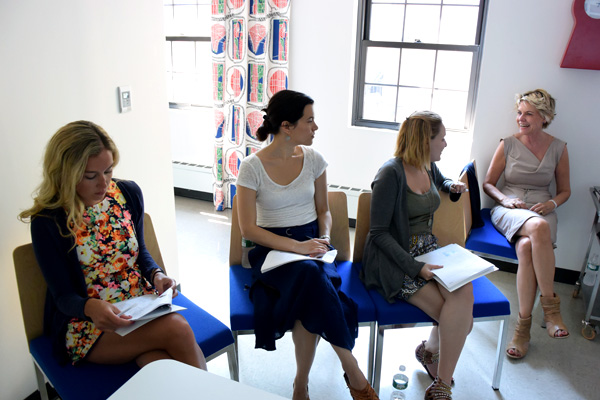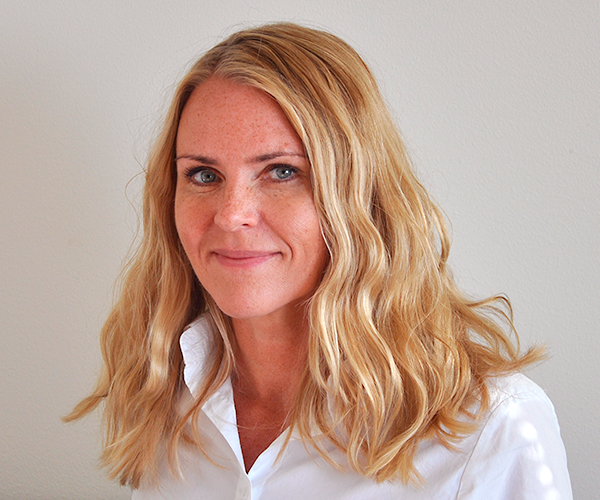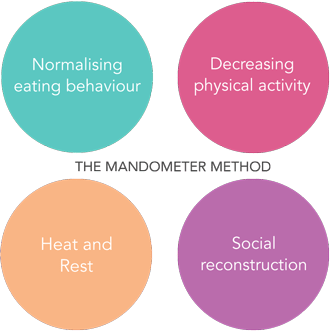What services do the Mandometer Clinics offer?
Mando Group AB is a private healthcare company that provides healthcare service through the Mandometer Clinics. We are engaged in healthcare development, technological development and research. We also provide preventive care; delivering lectures and running education seminars.
Learn more about the Mando Group >
Where are we?
Our clinics are located in Sweden; in Stockholm and in Alingsås.
Our Clinics >
Opening hours?
The Mandometer Clinic at Sophiahemmet is open 24 hours a day, 365 day per year.
The Mandometer Clinic in Alingsås and the Mandometer Clinic Hötorget are open 8.00am to 4.30pm Monday through Friday.
Staff and expertise
All staff involved in patient care at the Mandometer clinics undergo certification in “How to treat anorexia and bulimia” before working independently with patients. All staff participate in a structured training program that thoroughly reviews the theory and practice of ethics, causes, risk factors, starvation relation psychiatry, psychiatric comorbidity, medication use, learning theory, behavioural therapy, clinical overview and comparisons between Mandometer treatment and traditional eating disorder treatment.
A well functioning organisation require strong leadership. Mando Group AB invests a great deal of time and energy into developing the leaders of the company. Clinical managers participate in weekly management meeting, with the aim of continual improvement.
Number of patients in remission
To this day, we have treated over 2300 patients to remission. These patients are followed up for a further 5 years. Approximately 10% of patients relapse. Approximately 80% of patients participate in the follow-up program for at least half of the appointments.
Remission Criteria
- Normal eating behaviour and perception of satiety (able to eat 300-350g meal in 12-15 minutes)
- Normal weight (BMI 19-24 for women, BMI 20-25 for men)
- Normal blood samples
- Normal psychiatric status
- Returned to school or work
- Food and weight are no longer considered to be problems
- No binge eating or vomiting in the last three months
Diagnosis and severity
We treat all degrees of severity for the diagnoses of anorexia nervosa, bulimia nervosa binge eating disorder (BED) and other specified feeding or eating risorders (OSFED). We only exclude patients with ongoing alcohol and/or substance abuse issues.
Age and gender
We treat all ages and both genders.
Care services
Eating disorder patients with the following symptoms are in need of urgent medical attention:
- pulse rate of 35-40 beats/min and/or body temperature < 36° C
- hypokalaemia: K < 3.0 mmol/L
- hypophosphatemia: P < 0.65 mmol/L
- hypomagnesemia: Mg < 0.7 mmol/L
- ECG – changes with prolonged QTc interval > 450-500 m/sec
- acute dehydration > 6 % loss of body fluids
- suicide risk
The outpatient program runs from 8am-4pm and includes eating training, heat therapy, and an activity program and provides patients with support and motivation through discussions with Mandometer clinicians. The majority of patients attend from breakfast to the afternoon snack. Most of the patients receiving inpatient care eventually transition to the day program. Other patients may be admitted directly into the day program.
As patients progress, the hours that they attend the day program become less. For example, a patient my attend the clinic for up to three hours per day; eating one or two meals at the clinic and meeting with their case manager.
Other appointments
We monitor our patient’s health status for five years after they go into remission. We measure eating behaviour, physical activity, physiological state, psychiatric state and quality of life at month 1, 2, 3, 6, 9, 12, 18, 24, 36, 48 and 60 after remission has been achieved.
We provide a unique program for pregnant women who need support with food intake during their pregnancy
Everyone who works here has different skills and experiences. We have nurses, behavioural therapists, social workers, and nutritionists. Eating disorders, such as anorexia are complex illnesses with social, medical and psychological consequences, and it is to the advantage of the organisation if employees come from a variety of educational backgrounds.
Jennie Sjöberg, Director and Registered Nurse at the Mandometer Clinic Sophiahemmet.
Referrals to the Mandometer Clinic
We require the following information from referring health care professionals: age, weight, height (preferably weight and height curves for patients aged 18 years and below), physiological state (including heart rate), menstruation, current medications, eating disorder diagnosis, duration of illness, weight loss over the last three months, presence of binge eating, vomiting, excessive activity levels, previous treatment/s and risk of suicide. The referral should clearly state that Mandometer treatment has specifically been chosen.
Postal address:
AB Mando Mandometerkliniken, Södra Fiskartorpsvägen 15 H, 114 33 Stockholm, SWEDEN







